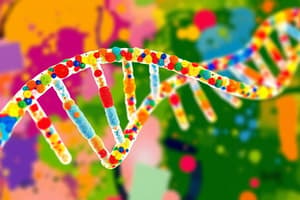Podcast
Questions and Answers
Qual é a forma da estrutura de DNA?
Qual é a forma da estrutura de DNA?
- Forma de espiral
- Hélice simples
- Tripla hélice
- Hélice direita dupla (correct)
Quantos tipos de bases nitrogenadas estão presentes no DNA?
Quantos tipos de bases nitrogenadas estão presentes no DNA?
- Duas
- Quatro (correct)
- Cinco
- Seis
Qual é a base que sempre se emparelha com a timina no DNA?
Qual é a base que sempre se emparelha com a timina no DNA?
- Citosina (C)
- Adenina (A) (correct)
- Uracila (U)
- Guanina (G)
Como são mantidos unidos os pares de bases complementares no DNA?
Como são mantidos unidos os pares de bases complementares no DNA?
Qual é a função das bases nitrogenadas no DNA?
Qual é a função das bases nitrogenadas no DNA?
O que compõe um nucleotídeo de DNA?
O que compõe um nucleotídeo de DNA?
Qual das seguintes opções mostra a correta emparelhamento de bases no DNA?
Qual das seguintes opções mostra a correta emparelhamento de bases no DNA?
Qual é o nome do princípio que explica a estruturação do DNA?
Qual é o nome do princípio que explica a estruturação do DNA?
Quais são os componentes básicos da estrutura do DNA?
Quais são os componentes básicos da estrutura do DNA?
Study Notes
DNA Structure
DNA, or deoxyribonucleic acid, is a complex molecule that carries the genetic instructions for life. Its structure is composed of two strands of nucleotides twisted around each other in a right-handed helix, a shape known as the double helix. The structure of DNA is crucial for its function, as it allows for the replication and transcription of genetic information. In this article, we will delve into the details of the DNA structure, focusing on the subtopics of nucleotides, base pairing, and the double helix.
Nucleotides
The building blocks of DNA are nucleotides, which are made up of three parts: a 5-carbon sugar called deoxyribose, a phosphate group, and a nitrogenous base. There are four types of nitrogenous bases in DNA: adenine (A), guanine (G), cytosine (C), and thymine (T). These bases are paired in a complementary manner, with A always bonding with T and C always bonding with G, a principle known as Chargaff's rules.
Base Pairing
Base pairing is the principle that explains the structure of DNA. Adenine (A) always pairs with thymine (T), and cytosine (C) always pairs with guanine (G). These complementary base pairs are held together by hydrogen bonds, which form between the nitrogenous bases on opposite strands. This base pairing is essential for the replication of DNA, as it allows for the formation of new strands during the process.
Double Helix
The double helix structure of DNA is a right-handed helix, with two strands of nucleotides twisted around each other. The two strands are antiparallel, meaning they run in opposite directions and are held together by hydrogen bonds between the complementary base pairs. The diameter of the DNA double helix is uniform throughout, ensuring that the information it carries can be accurately replicated and transcribed.
In conclusion, the structure of DNA is a marvel of biological engineering. Its nucleotides, base pairing, and double helix are all integral to its function, allowing for the transmission and expression of genetic information. Understanding these aspects of DNA structure has been fundamental to our modern comprehension of genetics and molecular biology.
Studying That Suits You
Use AI to generate personalized quizzes and flashcards to suit your learning preferences.
Description
Este artigo explora em detalhes a estrutura do DNA, com foco nos subtemas de nucleotídeos, pareamento de bases e a dupla hélice. A estrutura do DNA é essencial para sua função biológica, permitindo a replicação e transcrição da informação genética.




